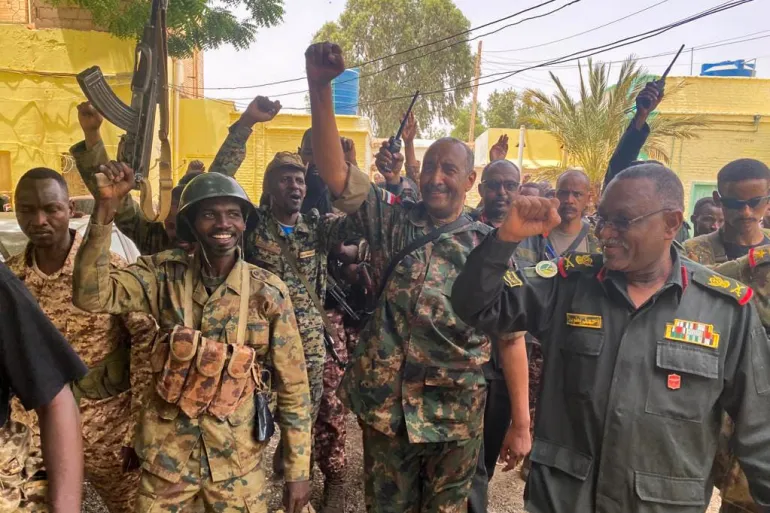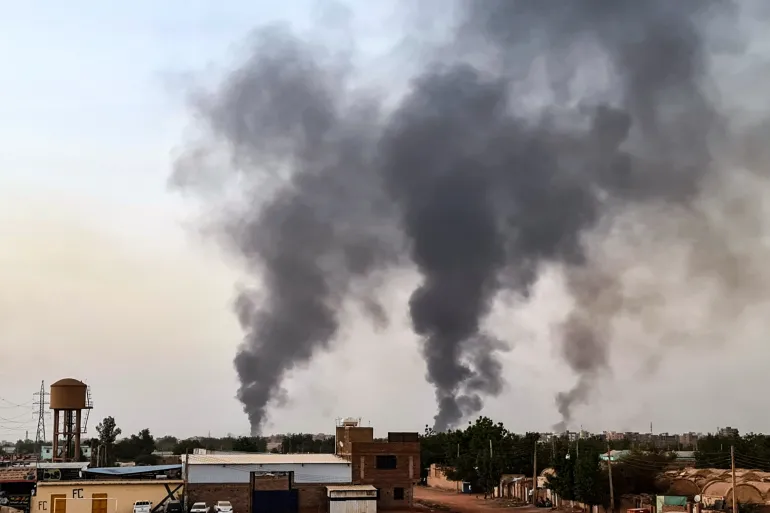Six weeks after fighting erupted between Sudan’s army and the RSF, multiple ceasefire deals have faltered and hundreds have been killed.

Efforts to end Sudan’s war, in its seventh week, suffered a major setback when the Sudanese army suspended talks with its rival paramilitary Rapid Support Forces (RSF).
Negotiations began in the Saudi Arabian port city of Jeddah in early May with the objective of protecting civilians and implementing ceasefire deals that have repeatedly been violated.
Sudan’s army has suspended its participation in talks over a ceasefire and humanitarian access, raising fears of renewed fighting that has displaced hundreds of thousands of people.
The talks with the rival paramilitary Rapid Support Forces (RSF) began in the Saudi Arabian port city of Jeddah in early May and produced a declaration of commitments to protecting civilians and two short-term ceasefire deals that have been repeatedly violated.
The army and the RSF had agreed to extend a weeklong ceasefire deal by five days just before it was due to expire late on Monday.
The general command of the armed forces said in a statement on Wednesday that it suspended talks, accusing the other side of a lack of commitment in implementing any terms of the agreement and a continuous violation of the ceasefire.
“The General Command of the Armed Forces has decided to suspend the current talks in Jeddah due to the rebel militia’s lack of commitment to the implementation any of the terms of the agreement and its continuous violation of the ceasefire,” according to the statement posted on Sudan News Agency website.
A spokesman for the army, Brigadier Nabil Abdalla, also told the Associated Press news agency the decision was in response to the RSF’s alleged “repeated violations” of the humanitarian ceasefire, including their continued occupation of hospitals and other civilian infrastructure in the capital, Khartoum.
In a statement, the RSF accused the army of halting the talks in Jeddah so that it could undermine them and of violating the ceasefire by using airpower and heavy artillery to attack its positions.

Later on Wednesday, the African Union (AU) said the suspension of talks should not discourage further attempts at mediation.
“In difficult negotiations, it is a classic phenomenon that one party suspends or threatens to suspend” its participation, Mohamed El Hacen Lebatt, chief of staff to the AU Commission president, and its spokesman for the Sudan crisis, told AFP news agency.
“But that should absolutely not discourage the mediators… the United States and Saudi Arabia, who we support very strongly, from continuing their efforts.”
https://imasdk.googleapis.com/js/core/bridge3.575.0_en.html#goog_646994867Play Video
Video Duration 01 minutes 21 seconds01:21See inside a refugee camp for Sudanese finding safety in Chad
Until late on Tuesday, intense clashes were reported in Sudan’s capital, Khartoum, with residents reporting intensive fighting in all three of the adjoining cities that make up Sudan’s greater capital around the confluence of the Nile – Khartoum, Omdurman and Khartoum North.
Al Jazeera’s Mohamed Vall said while the purpose of the talks in Jeddah was to help civilians “reorganise their lives”, the goal remained elusive.
“We have people still leaving Khartoum. We have people still trapped in their homes because [the] RSF, according to reports, is using civilians as human shields,” he added.
The truce was brokered and remotely monitored by Saudi Arabia and the United States, which say it has been violated by both sides and has allowed for the delivery of aid.
Alan Boswell, project director for the Horn of Africa at Crisis Group, told Al Jazeera the talks had always “failed to gain any traction”.
He said the army was seemingly convinced to join the talks as a tool to “force or convince” the RSF to pull out of several residential areas in Khartoum, but “that wasn’t happening”.
“The concern now is if these Jeddah talks collapse, it confirms more or less that Sudan is basically in freefall into a full civil war,” Boswell said.
“When I talk to diplomats, there is a growing sense of essentially, helplessness, as they feel like they’re watching Sudan collapse, but they are unable to get the two to stop fighting.”
The war has forced nearly 1.4 million people to flee their homes, including more than 350,000 who have crossed into neighbouring countries.
More than six weeks into the conflict, the United Nations estimated that more than half the population – 25 million people – require aid and protection.
Areas of the capital have been hit by widespread looting and frequent cuts to power and water supplies. Most hospitals have been put out of service.
The UN, some aid agencies, embassies and parts of Sudan’s central government have moved operations to Port Sudan, in Sudan’s Red Sea state, the main shipping hub which has seen little unrest.
Leaders of the army and the RSF had held the top positions on Sudan’s ruling council since former leader Omar al-Bashir was toppled during a popular uprising in 2019.
They staged a coup in 2021 as they were due to hand leadership of the council to civilians, before falling out over the chain of command and restructuring of the RSF under the planned transition.

More than 1,800 people have been killed since the battles began in mid-April, according to the Armed Conflict Location and Event Data Project, and more than 1.6 million people have been displaced within the country or across its borders, the UN has said, with many fleeing to Egypt, Chad and South Sudan.
Here are the main developments in the war raging in the northeast African country.
April 15: Fighting erupts
On April 15, heavy gunfire and explosions rock the capital Khartoum, sparking panic in the city of more than five million people on the Nile.
The army, led by Sudan’s de facto ruler Abdel Fattah al-Burhan, and the Rapid Support Forces (RSF), led by Burhan’s deputy-turned-rival Mohamed Hamdan Dagalo, known as “Hemedti”, each accuses the other of attacking first.
Fighting also erupts in the western region of Darfur, which is still reeling from a brutal war that started in 2003 under longtime ruler Omar al-Bashir.
April 22: Rush to evacuate
Countries rush to evacuate their nationals from Khartoum, by air or along desert roads, some lined with burned-out military vehicles.
Thousands flee in the frantic exodus while many embassies are ransacked.
Millions of Sudanese remain trapped in their homes, many quickly running short of water, food, medicines and basic supplies, and are fearful of the urban combat and roaming looters.
April 25: Failed truce, jailbreak
The US and Saudi Arabia negotiate a 72-hour truce but it is quickly violated. A series of further truce deals that follow meet the same fate.
Ahmed Harun, a leading figure in al-Bashir’s regime, which was deposed in 2019, announces he has escaped from prison.
The army says that al-Bashir, who is wanted by the International Criminal Court on genocide charges over the war in Darfur, was transferred to a hospital before the fighting began.
April 26:
Aid agencies raise alarm as humanitarian efforts are interrupted across the country. Organisations struggle to figure out how they can continue operating while ensuring the safety of their workers amid the fighting.
April 27:
The Sudanese army and the RSF agree to extend their ceasefire for “an additional 72 hours” amid continuing violence in Khartoum and the western Darfur region.
But fighting continues as warplanes patrol over the capital’s northern suburbs and fighters on the ground exchange artillery and heavy machine-gun fire, according to witnesses.
May 5: African ‘fortune seekers’
UN Special Representative Volker Perthes says armed “fortune seekers” from Mali, Chad and Niger are joining the fight, lured by money and gold.
His claim echoes the army’s allegation that the RSF is using mercenaries from elsewhere in Africa.
May 6: Jeddah talks start
US and Saudi-backed talks between army and RSF envoys begin in Jeddah.
May 11:
Both sides agree to allow urgently needed humanitarian aid to reach war-struck areas, committing “to ensuring the protection of civilians” but, again, the fighting never stops.
May 22:
A new one-week ceasefire comes into force on May 22 but is also repeatedly breached.
May 27:
Al-Burhan demands the dismissal of the UN envoy to Sudan, Volker Perthes, accusing him of having sparked the conflict.
May 31: Army walks out
On May 31, the army says it has suspended its participation in the ceasefire talks, accusing the RSF of failing to respect its truce commitments.





